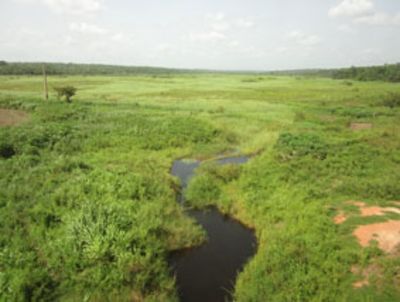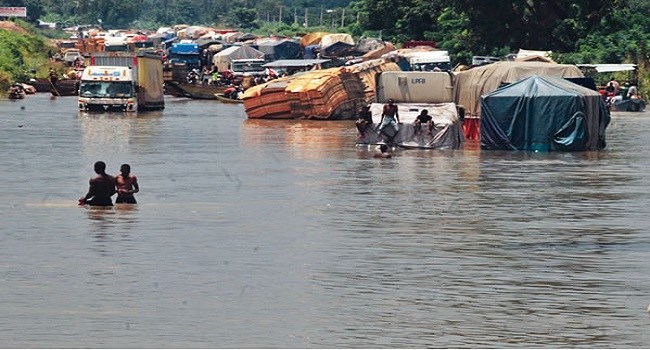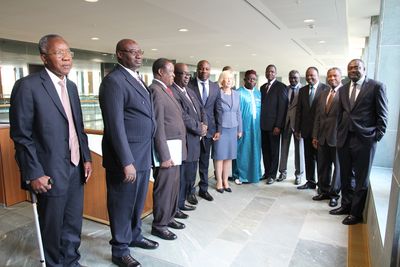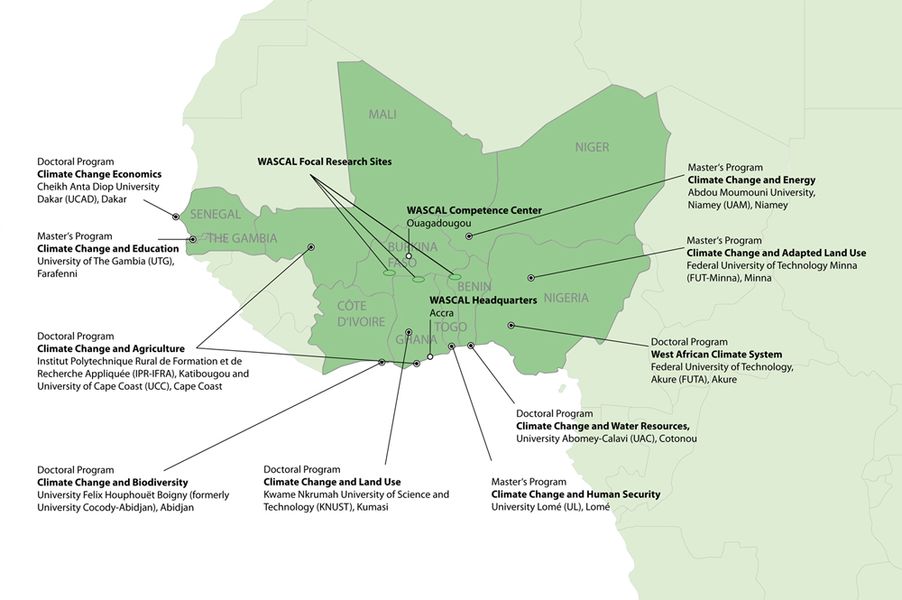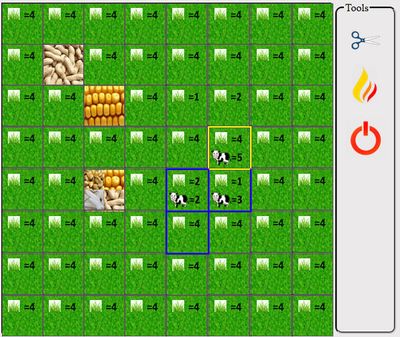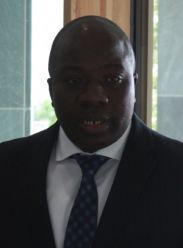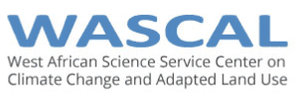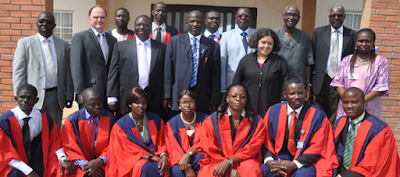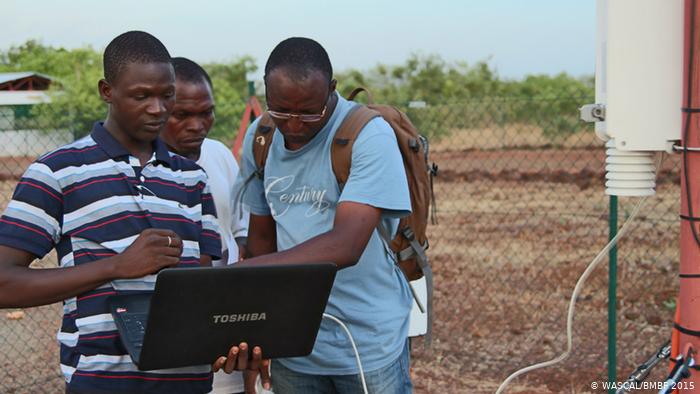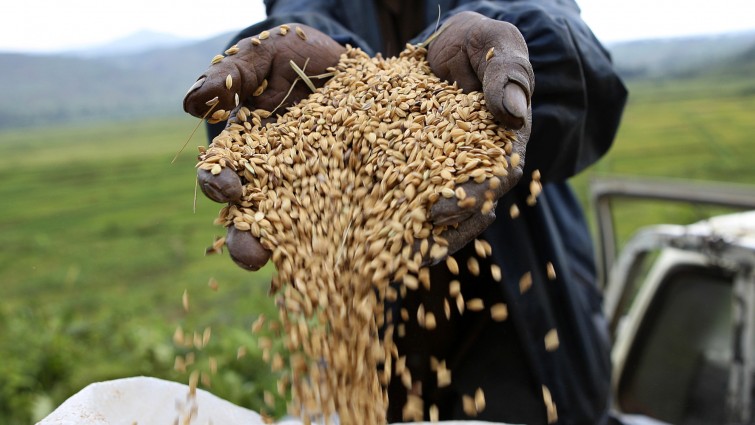ZEFnews No. 32 | 2
EDIToRIAL: RooT CAUSES oF MIGRATIoN NEED MoRE ATTENTIoN
Everyday we are confronted by a continuous series of pictures, videos, reports, and news revealing the plight of desperate people risking and sacrificing their lives to attain secure and better living conditions in countries in Europe, Asia and the Americas. According to statistics on forced migration in the UNHCR report “Global Trends”, almost 60 million people were forcibly displaced globally at the end of 2014. Among the displaced are internally displaced persons (38.2 million), refugees (19.5 million), as well as asylum seekers (1.8 million). The search for bet-ter living conditions forces thousands of people to travel either on broken-down boats across the Mediterranean Sea, as a human cargo in overcrowded and stifling trucks, or as stowaways on train routes such as the notorious “La Bestia” from Central to North America. The countries of the global North are complicit in creating the pres-ent refugee crisis with their refusal to implement legal immigration options and, thus, secure escape routes. The topography of forced displacement shows once more that the root causes of forced migration need more attention than in the past. The reasons why people are forced to migrate are multiple and related to a complex system of economic, environmental, social, and political intercon-nected processes and causalities. Since its inception in 1997, ZEF has been conducting interdisciplinary research in countries of the global South to find science-based solu-tions for precisely such development-related issues. It will have to intensify its efforts given the current crisis.Eva Youkhana has been Director of ZEF’s Department of Political and Cultural Change as of September 1, 2015
LEAD ARTICLE
THE “GRAZING GAME”: PLAYING CLIMATE CHANGE IN WEST AFRICA
The most extreme effects of climate change are projected in West Africa and are expected to occur in desert and grassland areas. It is crucial for local populations in this region to better understand what such projections mean for them so that they can develop sound adaptation poli-cies and interventions. For this purpose, we developed an online game, called the ‘grazing game’. With this comput-er-based game we conducted trials with local farmers at multiple study sites in West Africa. The grazing game is a learning tool to better understand the behavior of farmers in response to climate variability under semi-arid condi-tions and to facilitate social learning. The grazing game was also designed to reveal the human-induced processes that lead to over-grazing and desertification. So the game shows the players’ interactions with environmental condi-tions and their resulting decisions. Here, we are reporting on the game trials we conducted in Benin and Ghana. In Ghana, we conducted a total of 23 game trials around the Vea catchment of the Upper East Region of Ghana involving 243 individual farmers. In Benin, we explored gender-specific responses and coping strategies with respect to climate variability in the agrarian context. In Benin, we used a combination of a household survey and an experimental gaming exercise involving 260 households. 76 percent of the respondents were male and 24 percent female.Ghana: Playing climate changeThe game trials we ran in northern Ghana replicated rain-fall fluctuations and assessed the respective responses of
ZEFnews No. 32 | 3
local farmers. The farmers responded very positively and by playing the game were able to identify coping strategies such as selling cows, seeking government assistance, and engaging in alternative livelihood means. It turned out that the farmers participating in the game tended to avoid uncertain situations and sought to simplify their decisions. on the other hand, the game provided insights into the farmers’ rich ecological knowledge of environmental indi-cators. Based on the results of the game trial, we found that the game can facilitate instrumental and communica-tive learning processes among the players and facilitators. Further, the game can serve as a platform where players share their views, knowledge and perceptions of climate-related issues. Benin: Gender mattersThis study explores gender-specific responses to climate variability and related coping strategies in the agrarian context of Benin in West Africa. To date, there is only a limited understanding of gender-differentiated impacts of climate change in West Africa. Yet, there is an urgent need to integrate gender analyses into adaptation responses to climate change. only a few studies have explored the linkages between gender and agro-ecological sustainabil-ity, decision making, and the shaping of multi-functional landscapes. In this research conducted in the context of a semi-arid ecosystem in northern Benin, we explored the following questions: How do male and female farm-ers perceive and react to climate variability and extreme weather conditions? Do male and female perspectives dif-fer in terms of land-use preferences and coping strategies for climate variability? What determines related decisions under conditions of climate uncertainty? These research questions are linked to the overall understanding of resil-ience among subsistence agricultural systems in semi-arid ecosystems. Improved knowledge of gender-differentiated exposure and response to shocks, particularly climate change-related shocks, is key to helping communities become more resilient in the face of the risks and uncer-tainty associated with global climate change. Women are more active and innovativeRural subsistence farmers in northern Benin are suffer-ing from highly erratic rainfall patterns. Some of the 260 households interviewed about gender-related responses to climate variability also participated in an experimental gaming exercise. The results indicate that although men and women are equally aware of climate variability and share similar coping strategies, their specific land-use related strategies, preferences, and motivations differ. In this game, both male and female farmers played the role of land manager under erratic rainfall conditions. Both methods captured some aspects of the realities they are facing and common problems in the study area. Although perceptions and adaptation measures related to climate change are quite similar between men and women, the means, capabilities and motivations vary by gender. Thus, their approaches to the risks and uncertainties were also different. While men remain the primary decision makers in Benin households, women were found to respond in more active, dynamic and innovative ways (in terms of diversifying income sources) when dealing with rainfall variability. Men continued to engage in seasonal migra-tion or permanent relocation as a coping strategy, which is a common response to economic hardship. Although migration or relocation may increase household resilience for both those who stay and those who migrate, women are most likely to stay and continue to cultivate crops for household subsistence and thus bear the impacts of climate change.Games can make a differenceThus, the differences between male and female decisions lead to varying extents and ways of exposure to risk and vulnerability to climate change-related shocks and coping mechanisms in the long run. our study provides initial steps towards enhancing capacities for adaptation and resilience among rural subsistence farmers. We do so by addressing gender-specific responses to the effects of cli-mate change through anticipatory learning.
About the author
Grace Villamor is a senior researcher at ZEF. This research is funded by the WASCAL program (BMBF)
Contact: grace.villamor@uni-bonn
Organized by the Centre for Continuing Education, the WASCAL Graduate Research Program West African Climate System (GRP-WACS) and the Department of Meteorology & Climate Science of the Federal University of Technology Akure (FUTA), the workshop was held from September 14-18, 2015 at the Federal University of Technology, Akure.
The main target of the workshop was contributing to a better understanding of the causes and consequences of climate change among policy- and decision-makers. The program provided training on, among others, projections, variability and weather extremes, challenges, risks and opportunities related to climate change, adaptation, policy and governance as well as climate change policy design and response.
Professor Jerome Omotosho, Director of GRP-WACS, highlighted in his opening speech that the workshop was to provide adequate information and raise the understanding of climate change among stakeholders and most importantly facilitate discussion on which measures could be taken to put this knowledge into practice.
This is the first of a series of workshops planned in the next 9 months, by the three Departments of GRP-WASC and FUTA, on various aspects of climate change and weather. The next workshop is planned to be organized in collaboration with the WASCAL Master Program Climate Change and Adapted Land Use, Federal University of Technology, Minna and to thus expand the stakeholder reach.
Media Coverage:
FUTA workshop examines climate change causes, consequences, EnviroNews Nigeria, September 16, 2015.
Why we organised climate change information workshop- WASCAL chief, Newswatch Times, September 23, 2015
In an effort to broaden understanding of climate change and the capability for incorporating its issues into decision-making and policy development and implementation, the Federal University of Technology, Akure in collaboration with West African Science Service on Climate Change and Adapted Land Use Graduate Research Programme – West African Climate Science (WASCAL GRP-WACS, FUTA centre) and the Department of Meteorology and Climate Science of FUTA, embarked on a five-day training workshop on Climate Information for Adaptation and Policy Development.
The workshop, which drew participants from ministries, departments & agencies (MDAs), and university departments, is aimed at dealing with current topics on climate change causes, consequences, management and adaptation.
Specifically, the workshop is addressing issues of climate change: the science, causes and consequences; climate change projection, variability and extremes; climate change challenges, risks and opportunities; politics and economics of climate change; climate change mitigation; climate change: adaptation, policies and governance and climate change policy design and response.
ALSO READ: Photos: Opening of FUTA climate change workshop
Director, WASCAL GRP-WACS, Prof. Jerome Omotosho, in his welcome remarks at the opening session of the workshop on Tuesday, said there had been a lack of adequate information to stakeholders on climate change.
According to him, everyone talks about climate change but a lot of people do not really understand what it is all about.
He stressed that the workshop was organised to bring middle-level officers from MDAs and reach out to them on what climate change is all about, what brings it about and, importantly, what can we do.
“That is why we put this workshop together,” he said.
Director, Centre for Continuing Education, Dr. J.O Bashorun, said the environment is now threatened and human health and food scarcity is of concern to people even in the developed world.
Head of Meteorology and Climate Science Department, FUTA, Prof. Kehinde Ogunjobi, said the workshop is coming up in line with the new name of the department. He explained that, for the Third World countries, the issue is more of adaptation than mitigation.
ALSO READ: Climate change, food security: African Water Facility supports new Zambia dams
He added that the workshop would help to collate ideas which will be useful for policy and decision makers in addressing climate change challenge.
While declaring the workshop open, Vice-Chancellor of FUTA, Prof. Adebiyi Daramola, represented by his deputy, Prof. Tunde Arayela, noted that the world’s climate is changing and would continue to change, and that it has been postulated by scientists that, by the end of this century, global temperature will rise significantly by more than two degrees celsius.
He said such a level of warming and attendant changes in climate would have a severe impact on socio-economic development.
“There is now a growing shared understanding that the response to climate change can only be effective if it is linked with the broader array of policy and development.
“It is therefore obvious that the solution must involve multi-disciplinary research agenda with natural and social scientists working together to deliver sustainable strategies to combat this menace,” he added.
ALSO READ: Taking action on climate change will boost economic growth – OECD
Daramola, who congratulated the WASCAL director, Head of Meteorology and Climate Science department and the Centre for Continuing Education on the eventful milestone, said the institution management’s expectation is that the workshop will identify challenges presented by climate change, project into future and expectations, and develop pragmatic approach for adaptation.
He urged participants, as scientists, to synergise with both local, national and international institutions to assist in stopping degradation of the only home of man through workshop of this nature and advocacy programmes.
“The linkages between climate change and the three pillars of sustainable development – environment, social, and economic – are strong and deserve in-depth, expert discussion. It is, therefore, my sincere hope that this workshop will also play a catalytic role in helping policy and decision makers acquire deep understanding of climate change and work hard to mitigate its effects,” he added.
BONN. Wenn es in der öffentlichen Diskussion um den Klimawandel geht, kommt die Sprache meistens auf das von Autos und Fabriken in Unmengen ausgestoßene Kohlendioxid. Das viel gefährlichere Methan fällt dabei gerne mal unter den Tisch, dabei ist es als Treibhausgas rund 25-mal wirkungsvoller und trägt mit etwa 20 Prozent zum vom Menschen verursachten Treibhauseffekt bei.
Von Thomas Kölsch, 31.08.2015
Es entsteht unter anderem durch den Reisanbau – und genau an dieser Stelle will die junge Wissenschaftlerin Agatha O. Akpeokhai ansetzen. Die Nigerianerin erforscht mit einem einjährigen Internationalen Klimaschutzstipendium der Alexander-von-Humboldt-Stiftung an der Universität Bonn, wie sich dieser Treibhausgasausstoß in ihrem Heimatland, dem größten Reisproduzenten Westafrikas, effektiv drosseln lässt.
“Reis ist eines der wichtigsten Nahrungsmittel in Nigeria”, sagt die 28-Jährige, “also hat die Regierung jahrzehntelang immer mehr Flächen für den Anbau freigegeben. Das ist ja auch richtig, aber mit entsprechenden Maßnahmen ließe sich die Menge des dabei frei werdenden Methans durchaus reduzieren.” Vor allem die Bewässerung der Felder sei verbesserungswürdig. “Methan entsteht etwa bei Faulprozessen in stehenden Gewässern. Wenn man also die Felder ab und zu trocken legt, hat man schon etwas erreicht.”
Das Problem sei denn auch nicht, Alternativen zu den bestehenden Anbaumethoden zu finden, sondern vielmehr, die Reisbauern Nigerias von ihnen zu überzeugen. Denn Änderungen kosten Zeit und Geld, und auch wenn die Landwirte das Problem verstehen würden, so würden sie doch nicht die Resultate sehen, so Akpeokhai.
Dabei sollen nun jene Zahlen und Statistiken helfen, die die junge Frau zusammenstellt. “Wir müssen herausfinden, welcher Prozentsatz des Landes auf welche Weise für den Reisanbau genutzt wird und welche Emissionen aus den verschiedenen Anbaumethoden entstehen. Mit diesen konkreten Daten kann man dann mit der Regierung und mit den Landwirten reden und Optionen überprüfen, die effizient, finanzierbar und nachhaltig sind. Ziel ist es, jene Anbaumethoden zu fördern, die mit einem geringeren Ausstoß von klimawirksamen Gasen verbunden sind”, sagt Akpeokhai.
Ihre Forschungen hätte die Nigerianerin, die in ihrer Heimat Agrarwissenschaften studierte und sich dort während ihres Masters auf den Klimaschutz spezialisierte, dank des Stipendiums der Humboldt-Stiftung überall in Deutschland durchführen können. Die Wahl fiel allerdings recht schnell auf Bonn: “Die Fernerkundungs-Arbeitsgruppe von Herrn Professor Menz hat einen hervorragenden Ruf, ihre Forschungsarbeit ist faszinierend”, sagt Akpeokhai, die sich in der Bundesstadt sehr wohl fühlt und mit dem Stand ihrer Arbeit bereits recht zufrieden ist.
“Etwa die Hälfte ist fertig, 70 Prozent der Daten liegen bereits vor”, erklärt sie. “Wenn ich fertig bin, werde ich diese auch an die Bauern in Nigeria weiterleiten, an die Dorfvorsteher und an die Oberhäupter der verschiedenen Genossenschaften – und dann hoffe ich, dass alle die Bedürfnisse und auch die Vorteile sehen, ein paar Dinge zu ändern.”
In July, the Council of Ministers of the West African WASCAL countries met in Berlin. It was agreed that the member states will finance and operate WASCAL themselves in the future. The initiative is supported by the German Federal Ministry of Education and Research
The West African Science Service Center on Climate Change and Adapted Land Use (WASCAL), established in 2012, is an international and interdisciplinary research initiative whose aim is to build resilience to climate change and safeguard land use for food security. Funded by the German Federal Ministry of Education and Research (BMBF), WASCAL is implemented by numerous institutions from ten African countries. The initiative’s highest decision-making body, the Council of Ministers, convened in Berlin, Germany, in July. It was agreed that the member states will finance and operate the Center themselves in the future. The Center will therefore be integrated into the structures of the Economic Community of West African States (ECOWAS).
Johanna Wanka, German Federal Minister of Education and Research, emphasised that WASCAL does not mean research for or with Africa; it means research in Africa. Based on equality, it aims to halt the brain drain, which is a matter of great concern. WASCAL’s research will, above all, serve the interests of the countries themselves and provide advice to policy-makers working in the field of climate change. WASCAL comprises a Competence Center, a research programme and a graduate programme. More than 200 students have now completed the graduate programme, as Ghana’s Environment Minister Mahama Ayariga explained.
The German Federal Ministry of Education and Research is currently providing 50 million euros for WASCAL for a five-year period to 2017. A similar project in southern Africa (SASSCAL), involving five partner countries, receives the same amount. Benin, Burkina Faso, Côte d’Ivoire, Gambia, Ghana, Mali, Niger, Nigeria, Senegal and Togo are currently participating in the WASCAL initiative. Guinea, Guinea-Bissau, Cape Verde, Sierra Leone and Liberia, which are also members of ECOWAS, plan to join at a later date.
Climate change confronts the entire region with major challenges and worsens the existing problems of water availability, food security and poverty reduction. Consistent and high-quality data, e.g. on the hydrological cycle, land-use changes, biodiversity and vegetation, are essential as the basis for reliable forecasting of future trends. The aim is to develop practical adaptation measures that are tailored precisely to local conditions. For example, via WASCAL, a high-tech satellite-based surveillance system is being developed to monitor rainfall and changes in agricultural land use. In future, rainfall data will also be collected and evaluated in cooperation with mobile service providers. Since April this year, WASCAL has been participating in the Invest in Water project, which offers recommendations for decision-making on water and land use in the Volta-Niger focal region. Researchers are also studying conditions in the savanna in order to protect as many pollinators – e.g. insects and bats – as possible for key crops such as cotton and sesame.
Roland Krieg, journalist, Berlin/Germany
More information: WASCAL website
Lancée en 2012, WASCAL [1] est une initiative de recherche internationale centrée sur l’Afrique de l’Ouest. Elle vise à renforcer les capacités de recherche de dix pays de cette région [2] en matière de changement climatique. Cela passe notamment par le soutien aux équipes de scientifiques sur le terrain, l’investissement dans les infrastructures de recherche et la mise en place de cursus dans les universités ouest-africaines.
Dix parcours de formation (six doctorats et quatre masters) sur les thématiques liées au changement climatique ont été créés, en partenariat avec des universités allemandes. Plus de 160 jeunes sont actuellement impliqués dans ces cursus, qui portent sur l’agriculture, les questions énergétiques ou les ressources en eau. Un centre régional de compétences, installé à Ouagadougou (Burkina Faso), a également été mis en place. Il accueille des activités de recherche, et joue, auprès des autorités locales, un rôle de conseil et d’accompagnement sur les conséquences du changement climatique et les processus d’adaptation.
La question du climat est centrale pour le continent africain. Elle représente un défi majeur des décennies à venir, notamment du fait de ses répercussions sur le développement économique, l’accès à l’eau, la sécurité alimentaire et la santé.
Le 9 juillet 2015 s’est tenu à Berlin un conseil des ministres de la recherche des pays impliqués dans WASCAL. Cette assemblée est la principale instance de décision du programme. La rencontre a eu lieu à l’invitation de la Ministre fédérale allemande de l’enseignement et la recherche, Johanna Wanka. Elle a permis de faire le point sur les perspectives d’évolution du programme WASCAL pour les prochaines années.
Les ministres ont signifié leur volonté de poursuivre le programme, et décidé du fait qu’il sera à l’avenir coordonné et financé directement par les pays africains eux-mêmes. WASCAL devrait également être intégré aux structures de la Communauté économique des États de l’Afrique de l’Ouest (CEDEAO). A ce titre, il est envisagé d’élargir le périmètre d’intervention de WASCAL à l’ensemble du territoire de cette organisation, qui comprend également la Guinée, la Guinée Bissau, le Cap Vert, la Sierra Leone et le Libéria. Des représentants des gouvernements guinéen et bissau-guinéen ont d’ailleurs participé à la réunion en qualité d’observateurs.
Le programme WASCAL représente l’un des piliers de l’action du Ministère fédéral allemand de l’enseignement et de la recherche (BMBF) en Afrique, qui a investi pour sa mise en place, 50 millions d’euros. Cette mesure fait partie intégrante de la “Stratégie pour l’Afrique, 2014-2018” publiée par le BMBF à l’automne 2014, qui vise à renforcer les relations entre l’Allemagne et les pays africains en matière d’enseignement supérieur et de recherche. Un programme similaire, SASSCAL [3], existe par ailleurs pour les pays d’Afrique australe.
Plus d’informations :
[1] Site internet du programme WASCAL (West African Science Service on Climate Change and Adapted Land Use) : www.wascal.org
[2] Bénin, Burkina Faso, Côte d’Ivoire, Gambie, Ghana, Mali, Niger, Nigeria, Sénégal, Togo.
[3] Site internet du programme SASSCAL (Southern African Science Service Center for Climate Change and Adaptive Land Management) : http://www.sasscal.org/
Source : “Westafrika investiert in Forschung zum Klimawandel”, Communiqué de presse du BMBF, 09/07/2015 – www.bmbf.de/press/3824.php
Rédacteur : Kenny Abbey, kenny.abbey[a]diplomatie.gouv.fr – www.science-allemagne.fr
Informations complémentaires
Publications
Document de stratégie : “Une diplomatie scientifique pour la France”
La France et la promotion de l’archéologie à l’étranger
From an original board game, the team of the work package 6.2 Agent-based Modeling converted the grazing game to an online version. This online version grazing game is a new tool to explore the behavior and coping scoping strategies to negative impacts of climate change of both local farmer-herders and policy makers and consequences of their management decisions. It is designed to facilitate social learning that is crucial for co-management of landscapes in the drylands under climate uncertainties.
To play the game go to: http://grazing.bavarfaraz.net/
Contact: Dr. Grace Villamor, gracev(at)uni-bonn.de
Hohe Temperaturen infolge des Klimawandels während der Getreideblüte wirken sich stark negativ auf die Erträge aus. Forscher um Ehsan Eyshi Rezaei vom Bonner Institut für Pflanzenbau hat zusammen mit Kolleginnen und Kollegen des West African Science Service Center on Climate Change and Adapted Land Use (WASCAL) Grundlagenforschung für Ernteprognosen erarbeitet, die anhand von Temperatureinwirkungen nicht nur die Minderung des Gesamtertrages, sondern auch die Reduzierung des Ertragszuwachses und qualitative Verluste in der Kornfüllungsphase bei Weizen, Mais und Reis untersucht. Rezaei fand heraus, dass die Temperatur der Blätter beim Blattzusammenschluss über dem Boden der erste Hinweis auf Hitze- und Trockenstress bei den Pflanzen ist.
In Westafrika sind 80 Prozent der Bauern abhängig vom Auftreten des Westafrikanischen Monsuns. Cornelia Klein vom Meteorologischen Institut des Karlsruher Instituts für Technologie hat sich das nasse Wetterjahr 1999 angeschaut. Mit mehr als 27 regionalen Parametern der lokalen Wetterstationen hat sie einen starken Zusammenhang der Monsunereignisse mit der Peplosphäre feststellen können. Die Peplosphäre bezeichnet die unterste maximal zwei Kilometer mächtige Luftschicht der Atmosphäre, in der durch geologische Strukturen und Bodenreibung der Winde Turbulenzen entstehen. Das Verhalten des tropischen östlichen Jetstreams verursacht die verschiedenen Intensitäten des Westafrikanischen Monsuns in den Jahren 1979 bis 2010.
Forschung in Afrika
WASCAL besteht seit 2012 aus den drei Hauptkomponenten Kompetenzzentrum, Forschungsprogramm und Graduiertenprogramm, wurde als internationale und interdisziplinäre Forschungsinitiative gegründet und wird vom Bundesforschungsministerium finanziert. Zehn afrikanische Länder nehmen mit zahllosen Instituten an der Forschung teil. Die Ministerkonferenz ist das höchste Entscheidungsgremium und kam am Donnerstag in Berlin zusammen.
Ziel von WASCAL ist der Aufbau einer Widerstandsfähigkeit gegenüber dem Klimawandel und Aufrechterhaltung der Landnutzung für die Ernährungssicherheit. Bis 2014 wurde WASCAL vom Bonner Zentrum für Entwicklungsforschung (ZEF) der Universität Bonn koordiniert.
Nach der Sitzung betonte Forschungsministerin Dr. Johanna Wanka den Ansatz, dass WASCAL keine Forschung für und mit, sondern in Afrika sei. Forschung auf Augenhöhe, was dem gefürchteten Brain Drain entgegenwirken kann. Die Forschung dient vor allem den Ländern selbst und will als Elite-Forschung den politischen Entscheidern bei der Arbeit gegen den Klimawandel behilflich sein. Wichtig ist dabei das Graduiertenprogramm, das mittlerweile mehr als 200 Studenten durchlaufen haben, erklärte Ghanas Umweltminister Mahama Ayariga.
Förderung nach 2017
Das Forschungsministerium fördert derzeit WASCAL mit 50 Millionen Euro für fünf Jahre, die 2017 ablaufen. Ein vergleichbares Projekt im südlichen Afrika (SASSCAL) mit fünf Partnerländern erhält die gleiche Summe. Das Treffen in Berlin stellte die Weichen für die künftige Förderung. Die Minister hatten frühzeitig signalisiert, WASCAL eigenständig zu finanzieren und weiter zu betreiben. Nicht nur das wurde in Berlin beschlossen. In WASCAL sind die Länder Benin, Burkina Faso, Gambia, Ghana, die Elfenbeinküste, Mali, Niger, Nigeria, Senegal und Togo involviert. Zur westafrikanischen Wirtschaftsgemeinschaft (ECOWAS) gehören aber auch die Länder Guinea, Guinea-Bissau, Kap Verde, Sierra Leone und Liberia. Diesen fünf Länder wurde von Berlin eine Einladung zur Mitarbeit ausgesprochen, weil der Klimawandel sich nicht an Grenzen hält und auch dort wissenschaftliche Kapazitäten vorhanden sind.
ECOWAS-Präsident Kadré Désiré Ouedraogo und Cheikhe Hadjibou Soumaré, Präsident der westafrikanischen Wirtschafts- und Währungsunion (UEOMA) trafen vergangenen Montag in Brüssel mit EU-Entwicklungskommissar Neven Mimica zusammen und unterzeichneten die Vereinbarung für eine neue regionale Finanzierungsvereinbarung im Rahmen des 11. Europäischen Entwicklungsfonds (EEF). Mit 1,1 Milliarden Euro bis 2020 hat sich die Summe gegenüber dem vorherigen Zeitraum von 2008 bis 2013 nahezu verdoppelt. Ein Teil dieser Gelder ist für die nachhaltige Entwicklung natürlicher Ressourcen zur Stärkung der Resilienz und Stärkung der Ernährungssicherheit vorgesehen. Z. B. für WASCAL.
Wegen mangelnden Geldes wird WASCAL nach 2017 nicht eingestellt werden. Das Projekt ist Teil der „Afrika-Strategie“ des Bundesforschungsministeriums wie die „Grünen Zentren“ des Bundesentwicklungsministeriums. Der systematische Aufbau eines eigenen Klimaforschungszentrums soll nach Wanka den Ländern international mehr Gewicht verleihen und ihnen beispielsweise auf dem Pariser Klimagipfel mehr Gehör verschaffen.
Neue Forschungsfelder
Daten sind das Lebenselixier für die Forschung. Gerade Wetterdaten sollen wegen der komplexen Zusammenhänge so umfangreich wie möglich vorliegen. So will WASCAL Regendaten auch in Kooperation mit Mobilfunkbetreibern sammeln und auswerten. Seit April dieses Jahres wirkt WASCAL bei dem Projekt „Invest in Water“ mit. Dabei geht es um Entscheidungshilfen für die Wasser- und Landnutzung im Bereich der Volta-Niger-Region. Die „Cash Crop“ Baumwolle ist für Westafrika eine Brotfrucht. Forscher untersuchen derzeit die Beschaffenheit der Savanne, um möglichst viele Bestäuber wie Insekten oder Fledermäuse für Baumwolle oder Sesam zu erhalten.
Lesestoff:
Besuchen Sie die neue Webseite von WASCAL www.wascal.org
Roland Krieg; Fotos: roRo
Berlin. – Das Forschungszentrum zu Klimawandel und Landnutzung WASCAL (West African Science Service Center on Climate Change and Adapted Land Use) geht in afrikanische Verantwortung über. Das Zentrum wurde 2012 ins Leben gerufen. Für den Aufbau stellte das Bundesministeriums für Bildung und Forschung (BMBF) 50 Millionen Euro bereit.
In Westafrika beteiligen sich derzeit zehn Länder an dem Forschungszentrum: Benin, Burkina Faso, Gambia Ghana, Elfenbeinküste, Mali, Niger, Nigeria, Senegal und Togo. Es ist ein zentrales Vorhaben des Bundesministeriums für Bildung und Forschung im Rahmen seiner Afrika-Strategie, um vor Ort langfristig wissenschaftliche Kapazitäten zum Klimawandel und zum Umgang mit den Auswirkungen auf die Landnutzung in Afrika aufzubauen.
Die westafrikanischen Länder sagten jetzt zu, das Forschungszentrum zukünftig in eigener Regie weiter zu betreiben und zu finanzieren. Dazu wollen die Länder eigene Beiträge erbringen und das Zentrum in die Strukturen der westafrikanischen Wirtschaftsgemeinschaft ECOWAS integrieren. Dies beschloss der Ministerrat als das höchste Entscheidungsgremium des WASCAL, der auf Einladung von Forschungsministerin Wanka in Berlin tagte. Auf der Konferenz wurde zudem beschlossen, den Teilnehmerkreis um die Länder Guinea-Bissau, Guinea, Kap Verde, Sierra Leone und Liberia zu erweitern.
“Heute wird Wirklichkeit, was politisch schon so häufig – und zuletzt in der Erklärung des G7-Gipfels von Elmau – zum Ausdruck gebracht wurde: Afrika baut eigene Kompetenzen auf, um dem Klimawandel zu begegnen. Mit diesem Forschungszentrum, an dem sich viele Länder beteiligen, haben wir gemeinsam große Schritte getan, um dauerhaft die Wissensgrundlagen zum Klimawandel in Westafrika zu schaffen” sagte Wanka nach der Sitzung des Ministerrates.
Der systematische Aufbau einer eigenen Klimaforschungskompetenz ist aus der Sicht des BMBF wichtig, auch um in den internationalen Klimadebatten verstärkt einen afrikanischen wissenschaftlichen Standpunkt einzubringen. Der Klimawandel stellt die gesamte Region vor große Herausforderungen und verschärft bestehende Probleme der Wasserverfügbarkeit, Ernährungssicherung und Armutsbekämpfung.
Landwirtschaft ist die Existenzgrundlage großer Teile der westafrikanischen Bevölkerung. Ein Beispiel ist die landwirtschaftliche Nutzung der Savannen. Dort sind Böden und Klima bislang so gut, dass Hirse, Mais, und andere wichtige Nutzpflanzen gut gedeihen. Doch für diese Gebiete sagen die Klimaprognosen größere Schwankungen der Niederschläge voraus.
Solche Vorhersagen verdeutlichen den Bedarf nach konsistenten und qualitativ hochwertigen Daten, beispielsweise zum Wasserkreislauf, zu Landnutzungsänderung, zur Biodiversität oder Vegetation. Durch WASCAL wird beispielsweise ein hochmodernes satellitengestütztes Überwachungssystem entwickelt, dass Niederschlagsmengen und die veränderte Nutzung von landwirtschaftlichen Flächen erfasst. Damit können kleinräumige, konkrete Anpassungsmaßnahmen erarbeitet werden.
Mittlerweile entstanden im Rahmen von WASCAL bereits 10 Graduiertenprogramme (6 Doktoranden- und 4 Masterprogramme). Diese werden von fachlich ausgewiesenen Universitäten in Westafrika in Zusammenarbeit mit deutschen Partneruniversitäten durchgeführt. Inzwischen befinden sich mehr als 160 Nachwuchswissenschaftler in der Ausbildung, von denen bis dato bereits 60 erfolgreich die WASCAL-Graduiertenprogramme absolviert haben. Die Promotions- und Masterprogramme widmen sich vor allem den Auswirkungen des Klimawandels auf die Landwirtschaft, die Biodiversität und Wasserressourcen, oder die Energieversorgung und die Wirtschaft.
Quelle: www.bmbf.de
Klimaschutz Landwirtschaft Klimawandel
Thirteenth (13th) October 2014 will remain a ‘memorable day’ in the history of WASCAL CC&ALU hosted by the Federal University of Technology, Minna. The MRP scored a big first in the WASCAL programme….sending forth the first set of WASCAL graduates into the research community to give back to the world after the huge investment on them as scientists. Two years of hard work finally paid off.
Our August dignitaries graced the occasion. Prof Musbau A. Akanji (the Vice-Chancellor of the Federal University of Technology, Minna) and his team of Principal Officers received the guests which comprised the Honorable Minister of Environment of Nigeria, who was very unavoidably absent but ably represented by Dr Jare Adejuwon, the Director of Climate Change Department in the Ministry; the German Ambassador to Nigeria who was ably represented by Mr Dirk Schulz; Chairman of WASCAL Board (Prof Haidara), WASCAL Board member representing Nigeria and Second Vice Chairman (Prof Osuntogun); Executive Director and his team (Dr Sedogo, Ouattara and Mr Ofori); The Vice Chancellor of FUTA ably represented by Prof Bayo Omotosho; representatives of our two German Partner Universities (Dr Thiel and Mrs Boutros, who is also the GRP/MRP Coordinator of WASCAL); members of WASCAL CC&ALU International Regional Advisory Board comprising Prof Bayo Omotosho (Director WACS FUTA), Dr Eric Forkuo (representing KNUST), Dr Georges Abbey (representing University of Lome), Mrs Christine K (from HBF representing the Civil Society), Dr Jare Adejuwon (representing Focal Ministry); members of FUT Minna Advisory Board led by the Dean of Postgraduate School, Prof (Mrs) Stella Zubairu; staff and students of WASCAL and representatives of the Press.
The ‘big day’ tagged WASCAL DAY commenced with the ceremony marking the graduation of the 2012/2013 Batch of WASCAL CC&ALU students. While the sponsoring Ministry in Germany, BMBF was showered with gratitude for the foresight demonstrated through the WASCAL programme, congratulatory and encouraging messages were passed on to the students to be worthy Ambassadors of WASCAL. The commitment of the Nigerian Government to the successful implementation of WASCAL was emphasized by the Honourable Minister’s representative. To add glamour to the occasion, the traditional dancers, Gwape Troupe, invited to entertain the guests decided to invite dignitaries to the ‘shake body’ to the entertaining music. From there, the newly completed WASCAL CC&ALU building was commissioned.
The guests were introduced to WASCAL by the Director CC&ALU at the reception, while along the corridors of this simple but beautiful building, A0 Size posters were exhibited showcasing the students’ research. Each student stood beside his/her poster to explain the content to the guests. During the luncheon organized to round up activities for the day, three students were recognized and presented with personalized plaques: Mr SANOGO, Karamoko (Most improrved student); Miss KIMA, Sophie A. (Best Research); and Mr ADENLE, Ademola Andrew (The Overall Best Student). The 2012/2013 Batch of WASCAL CC&ALU graduates have since left for their various countries as the very first ALUMNI of the programme. The Director of CC&ALU gratefully acknowledges the contribution of the University Management, guests and WASCAL staff and students to the success of the WASCAL DAY in FUT Minna.
Useful links
icg4wascal.icg.kfa-juelich.de/nachrichten-en/wascal2018s-first-graduates-ten-students-successfully-completed-their-master2018s-degree-in-climate-change-and-adapted-land-use-at-fut-minna.
http://www.futminna.edu.ng/index.php/news/item/87-wascal-graduates-10-students-minister-commissions-wascal-complex-graduation .
http://www.environewsnigeria.com/fut-minna-produced-first-wascal-graduates/
WASCAL ist ein Forschungsnetzwerk in Westafrika, das die Folgen des Klimawandels untersucht. Bis 2017 wird es von Deutschland finanziert. In Berlin wurden jetzt die Weichen für die Zeit danach gestellt.
Früher musste Peter Dery auch schon mal aus Forschungsgründen nach Europa reisen. Aus recht simplen Gründen, wie der Klimapolitik-Koordinator aus Ghana sagt: “Wenn man in unseren Ländern solide Daten über Afrika braucht, dann muss man oft nach Europa kommen.” Diese Zeit ist seit 2012 vorbei – seit es die Forschungsinitiative WASCAL gibt.
Bundesforschungsministerin Johanna Wanka (CDU) hatte nun die Forschungs- und Bildungsminister der westafrikanischen Partnerländer nach Berlin eingeladen, um über die Weiterentwicklung jener Forschungskooperation zu sprechen, die für Klima-Koordinator Dery eine neue Zeitrechnung anbrechen ließ: “Mit WASCAL bekommen wir Daten zum Klimawandel aus Afrika – und das in Afrika.”
WASCAL, eine von zehn westafrikanischen Staaten und Deutschland ins Leben gerufene Forschungsinitiative, hat eigenständige Forschungskapazitäten im Kampf gegen Klimawandel und Landerosion in der Region aufgebaut. Statt Daten teuer von ausländischen Firmen einzukaufen, werden sie jetzt vom qualifizierten Wissenschaftsnachwuchs aus Westafrika selbst gewonnen. Mit dabei sind die Länder Ghana, Benin, Togo, Burkina Faso, Gambia, Elfenbeinküste, Niger, Nigeria, Senegal, Mali und Deutschland. “Damit hat die Forschungsinitiative ‘West African Science Service Center on Climate Change and Adapted Land Use’ eine wichtige Lücke geschlossen”, sagt Dery, der inzwischen Mitglied des Aufsichtsgremiums von WASCAL ist.
Finanzierung ab 2017 gesichert
In Berlin wurde jetzt über die Weiterentwicklung des Projekts WASCAL beraten. Und bereits nach wenigen Stunden intensiver Gespräche konnte Bundesforschungsministerin Wanka einen Erfolg vermelden: Demnach sagten die afrikanischen Partner zu, die Finanzierung des Projekts ab 2017 selbst zu übernehmen. Deutschland hatte das Projekt für die ersten fünf Jahre mit 50 Millionen Euro unterstützt. “Wir haben hier etwas gesichert, was wir immer anstreben, was wir aber nicht immer erreichen, nämlich die Langfristigkeit und Nachhaltigkeit von Projekten”, freute sich Wanka.
Mahama Ayariga, Minister für Umwelt, Wissenschaft und Innovation aus Ghana, hob mit Blick auf die vergangenen drei Jahre intensiver Kooperation hervor, wie effizient der regionale Forschungsverbund arbeite: “Wir müssen hier keine Doppelstrukturen aufbauen, um die notwendigen Daten im Kampf gegen den Klimawandel zu bekommen, sondern genau hier zeigt sich der große Vorteil, Daten gemeinsam zu analysieren und sie dann allen zur Verfügung zu stellen”, so der Minister.
Ein regionaler Forschungsverbund – mit Modellcharakter
Ein regionales Netzwerk von Forschungstationen verbindet die Länder Burkina Faso, Ghana und Benin. Dort werden Daten zu Klima, Wasser, Biodiversität und Landnutzung erhoben. Die Verwaltung des Projekts sitzt in Accra in Ghana, das Kompetenzzentrum für Forscher wird gerade in Ouagadougou in Burkina Faso aufgebaut. Zudem wurden an zehn Universitäten in der Region Graduiertenprogramme für wissenschaftlichen Nachwuchs im Bereich Klima und Landnutzung ins Leben gerufen. “Insgesamt 200 Doktoranden und Masterstudenten haben das Programm bereits durchlaufen”, erklärte der Minister aus Ghana. Und Forschungsministerin Wanka fügte erfreut hinzu, dass alle zehn Graduiertenschulen fest in den Universitäten verankert werden konnten.
Wanka kündigte zudem an, dass derzeit im Rahmen des Projekts auch ein satellitengestütztes Überwachungssystem aufgebaut werde, ebenso wie zentrale Datenserver, auf die alle Projektpartner zugreifen können. “Das soll dazu führen, dass die Daten dort konzentriert ausgewertet werden können, um sie dann in Echtzeit zu nutzen.”
WASCAL ist ein Weg für Know-how-Transfer
Gerade mit Blick auf den Weltklimagipfel in Paris seien solide wissenschaftliche Daten eine wichtige Voraussetzung, um dann die richtigen Maßnahmen treffen zu können, so Mahama Ayariga: “Wenn wir afrikanischen Länder nach Paris kommen, dann werden wir darauf bestehen, dass es einen Know-how-Transfer gibt, der uns in die Lage versetzt, all das zu machen, was wir machen müssen, um den Klimawandel zu bekämpfen.” WASCAL sei für ihn dabei die perfekte Vorlage, so der Minister auf die Frage, wie dieser Know-how-Transfer aussehen sollte. “Hier kooperieren die Wissenschafts-Community aus Westafrika und die Wissenschafts-Community aus Deutschland, um gemeinsam nach wissenschaftlichen Antworten zu suchen.”
Auch Forschungsministerin Wanka betonte den neuen Geist der deutsch-afrikanischen Forschungskooperation, die “auf Augenhöhe” stattfinde. So profitierten letztlich auch deutsche Forschungsinstitute von den gesammelten Daten. Unter den Instituten das Karlsruhe Institute of Technology (KIT), das Forschungszentrum Jülich und das Deutsche Zentrum für Luft- und Raumfahrt (DLR) in Köln. WASCAL-Aufsichtsrat Peter Dery aus Ghana hob hervor, dass dieser kooperative Geist sich auch in der Nutzung der gesammelten Daten widerspiegele: “Jedes einzelne Mitgliedsinstitut besitzt die vollen Rechte an den Daten und kann frei über die Nutzungsrechte verfügen.” Für Dery ist daher klar: Wenn er in Zukunft wieder nach Europa reist, dann vor allem, um die eigenen Daten seinen europäischen Kollegen vorzustellen. Für ihn ein echter Quantensprung.
Die Redaktion empfiehlt
Nobelpreisträger formulieren gemeinsame Erklärung zum Klimawandel
Auf der Lindauer Nobelpreisträgertagung haben einige der weltweit führenden Wissenschaftler eine gemeinsame Erklärung gegen den Klimawandel unterzeichnet – mit dem dringenden Aufruf zum Handeln. Aber was hilft das? (03.07.2015)
Papst ruft in Ecuador zu Umweltschutz auf
“Wir können nicht der Realität, unseren Brüdern, unserer Mutter Erde weiter den Rücken zukehren”, sagte er in seiner Rede bei einem Zusammentreffen mit tausenden Studenten und Dozenten in der Hauptstadt Quito. (08.07.2015)
Audio und Video zum Thema
Senegals Böden retten (22.06.2015)
Armut verschärft Umweltprobleme
Datum 09.07.2015
Autorin/Autor Richard A. Fuchs, Berlin
Themenseiten Klimawandel
Schlagwörter WASCAL, Klimawandel, Klimafolgenforschung, Westafrika, Technologietransfer
Feedback: Schreiben Sie uns!
Drucken Seite drucken
Permalink https://p.dw.com/p/1FvlJ
Zusammen mit elf afrikanischen Ländern hat die Bundesregierung in Afrika ein Klimaforschungszentrum einrichten lassen. Jetzt will sich Deutschland zurückziehen und das Ruder ganz den afrikanischen Wissenschaftlern überlassen. Das Institut soll zu einem international anerkannten Wissenschaftsstandort werden – und den Bauern im Land helfen.
Günter Nooke im Gespräch mit Regina Brinkmann
Es kommt selten vor, dass Bundesforschungsministerin Johanna Wanka gleich neun Ministerkollegen aus Westafrika zu Besuch hat. Sie sind auf Einladung der Ministerin nach Berlin geflogen, um über die Zukunft des gemeinsamen Klimaforschungszentrums WASCAL zu diskutieren. WASCAL, das Abkürzungsmonstrum steht für „West African Science Center on Climate Change“, zu deutsch: Forschungszentrum für Klimawandel und angepasstes Landnutzung in Westafrika“. Es ist eine einzigartige Initiative in der wissenschaftlichen Entwicklungszusammenarbeit zwischen Afrika und Deutschland. Erstmals wurde ein Forschungszentrum für eine ganze Region aufgebaut, nicht als kurzfristiges Projekt, sondern als dauerhafte Institution. Ziel sei, langfristig eigene Forschungskapazitäten in Afrika zu schaffen und zu erhalten, erklärte Bundesbildungsministerin Johanna Wanka.
„Das heißt Aufbau von Kompetenzen, gemeinsam mit Afrika, also keine Forschung für Afrika oder in Afrika, sondern mit Afrika auf Augenhöhe.“
Die zehn beteiligten Länder wurden von Anfang mit in die Verantwortung genommen, organisatorisch und in geringem Maße auch finanziell. Bei der heutigen Sitzung nun geht es darum, wie das Zentrum, dessen Aufbau vom Bundesforschungsministerium mit 50 Millionen Euro gefördert wurde, langfristig ganz in die afrikanische Finanzierung übergehen kann. Eine Möglichkeit wäre, dass die westafrikanische Wirtschaftsunion ECOWAS, das Pendant der EU in Westafrika, als Träger einsteigt. Der Wissenschaftsminister Ghanas, Mahama Ayariga, unterstrich die Bedeutung des Zentrums für die gesamte Region.
„Diese Infrastruktur ist absolut notwendig, um die Länder in die Lage zu versetzen, die negativen Folgen des Klimawandels zu bekämpfen, denen wir zunehmend ausgesetzt sind. Wir glauben, dass es ein exzellentes Modell ist, das auf der ganzen Welt Nachahmer finden könnte, erklärte Ayariga.“
Konkrete Handlungsempfehlungen für Regierungen und Landwirte
Mit dem Schwerpunkt Klimaforschung widmet sich WASCAL einem der drängendsten Themen in der Region.
„Gerade das westliche und das südliche Afrika wird extrem in den nächsten 15 bis 35 Jahren unter Klimawandeleffekten leiden, insbesondere in Bezug auf höhere Temperaturen und unsichere Niederschlagsmengen.“
Sagt Christian Borgemeister, Direktor des Zentrums für Entwicklungsforschung an der Universität Bonn, das als deutscher Projektpartner für WASCAL fungiert. Die milliardenschwere internationale Klimaforschung hat sich bislang wenig um Afrika gekümmert. Hier gebe es ein großes Forschungsdefizit, betont Borgemeister, zum Beispiel bei der Berechnung von präzisen Klimaprognosen für die Region. Darüber hinaus wird erforscht, wie sich die größtenteils von Niederschlägen abhängige Landwirtschaft auf die Veränderungen einstellen kann – teilweise auch durch die Rückbesinnung auf altes Wissen der Bauern. In den letzten Jahrzehnten etwa habe Mais die Hirse als Hauptnahrungsmittel abgelöst.
„Da sind sehr viel auch wirtschaftliche Interessen, die dahinter steckten, dass Mais sehr stark propagiert wurde. Unter Klimawandelaspekten: Keine ideale Cerealie. Ganz im Gegenteil. Da gibt es Arten, die sehr viel adaptierter an aridere Bedingungen sind: Sorgum, Hirse. Und das ist beispielsweise lokales Wissen.“
WASCAL wird von den Ländern Benin, Burkina Faso, Gambia, Ghana, Elfenbeinküste. Mali, Niger, Nigeria, Senegal und Togo mitgetragen. Die Pläne sind ehrgeizig: Das Zentrum möchte als afrikanischer Wissenschaftsplayer international mitreden und der Region mehr Gehör verschaffen. Mittlerweile werden über 160 Nachwuchswissenschaftler in Graduiertenkollegs ausgebildet, davon 40 gefördert über Stipendienprogramme. Die Forschungsergebnisse sollen in konkrete Handlungsempfehlungen für die afrikanischen Regierungen einfließen, aber auch privaten Bauern zur Verfügung stehen.


